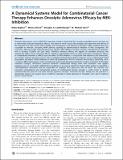A Dynamical Systems Model for Combinatorial Cancer Therapy Enhances Oncolytic Adenovirus Efficacy by MEK-Inhibition
Author(s)
Bagheri, Nada; Shiina, Marisa; Lauffenburger, Douglas A.; Korn, W. Michael
DownloadBagheri-2011-A Dynamical Systems Model for Combinatorial Cancer Therapy Enhances Oncolytic Adenovirus Efficacy by MEK-Inhibition.pdf (1.107Mb)
PUBLISHER_CC
Publisher with Creative Commons License
Creative Commons Attribution
Terms of use
Metadata
Show full item recordAbstract
Oncolytic adenoviruses, such as ONYX-015, have been tested in clinical trials for currently untreatable tumors, but have yet to demonstrate adequate therapeutic efficacy. The extent to which viruses infect targeted cells determines the efficacy of this approach but many tumors down-regulate the Coxsackievirus and Adenovirus Receptor (CAR), rendering them less susceptible to infection. Disrupting MAPK pathway signaling by pharmacological inhibition of MEK up-regulates CAR expression, offering possible enhanced adenovirus infection. MEK inhibition, however, interferes with adenovirus replication due to resulting G1-phase cell cycle arrest. Therefore, enhanced efficacy will depend on treatment protocols that productively balance these competing effects. Predictive understanding of how to attain and enhance therapeutic efficacy of combinatorial treatment is difficult since the effects of MEK inhibitors, in conjunction with adenovirus/cell interactions, are complex nonlinear dynamic processes. We investigated combinatorial treatment strategies using a mathematical model that predicts the impact of MEK inhibition on tumor cell proliferation, ONYX-015 infection, and oncolysis. Specifically, we fit a nonlinear differential equation system to dedicated experimental data and analyzed the resulting simulations for favorable treatment strategies. Simulations predicted enhanced combinatorial therapy when both treatments were applied simultaneously; we successfully validated these predictions in an ensuing explicit test study. Further analysis revealed that a CAR-independent mechanism may be responsible for amplified virus production and cell death. We conclude that integrated computational and experimental analysis of combinatorial therapy provides a useful means to identify treatment/infection protocols that yield clinically significant oncolysis. Enhanced oncolytic therapy has the potential to dramatically improve non-surgical cancer treatment, especially in locally advanced or metastatic cases where treatment options remain limited.
Date issued
2011-02Department
Massachusetts Institute of Technology. Department of Biological EngineeringJournal
PLoS Computational Biology
Publisher
Public Library of Science
Citation
Bagheri, Neda, Shiina M, Lauffenburger DA, Korn WM (2011) "A Dynamical Systems Model for Combinatorial Cancer Therapy Enhances Oncolytic Adenovirus Efficacy by MEK-Inhibition." PLoS Comput Biol 7(2): e1001085. doi:10.1371/journal.pcbi.1001085 © 2011 Bagheri et al.
Version: Final published version
ISSN
1553-7358
1553-734X